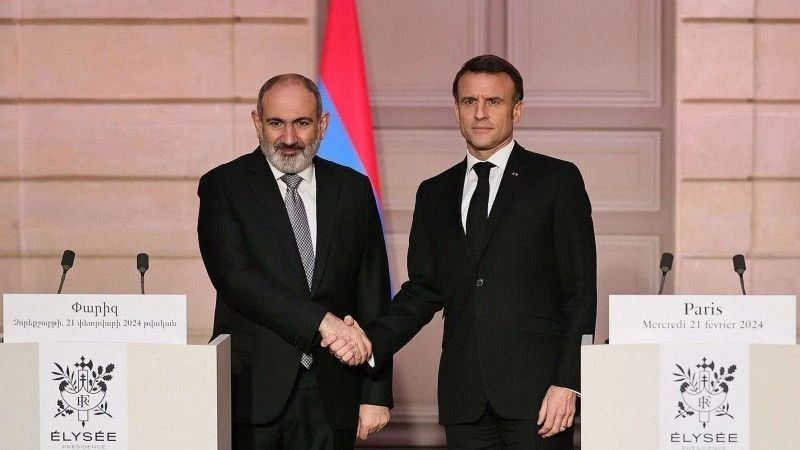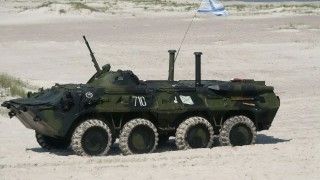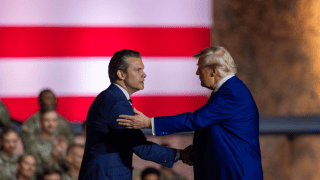- WIADOMOŚCI
France Retaliates Against Russia in Central Asia and Caucasus
The Franco-Russian rivalry has reached a new international level. Until recently, it seemed that Africa would be the main battleground. However, Paris has lost influence in several African countries and has changed its strategy. Now, it has decided to retaliate and engage in a region where Moscow has long established its influence – Central Asia & Caucasus. France has initiated talks with Armenia, Kazakhstan, Uzbekistan, and is also seeking opportunities in Mongolia. This poses a problem for Russia, as it now has to closely monitor this region and adjust its presence accordingly.

Two years have passed since the Russian Federation’s invasion of Ukraine. Currently, the main focus, including for the French Republic, is on providing support to the Ukrainians. This indicates a shift in the perception of Moscow by Western European countries. The President of France has emphatically identified Russia as the main threat to European and global security, and has added that the security of France and the French people depends on Ukraine’s victory; essentially framing the war in Eastern Europe as a challenge for his country.
The rivalry with Russia has taken on a global dimension and is evident in every geographical region. Threats to the countries on NATO’s eastern flank, attempts to displace the French from Africa by increasing the number of Wagner Group mercenaries in Mali, the Central African Republic, and Burkina Faso, along with military maneuvers in Belarus and Transnistria, have all led to intensified relations between the French Republic and its partners in the Caucasus. Central Asian countries have traditionally been closely associated with Moscow. Seeing the Kremlin’s actions in the Sahel countries, France decided in 2023 to strengthen relations not only with Ukraine, but also with Armenia, Kazakhstan, Uzbekistan, and Mongolia, while also tightening ties with India.
Back in 2017, during his presidential campaign, Emmanuel Macron advocated for the need to build a „power of balance” (puissance d«équilibre), which meant avoiding labeling Russia as an enemy. Although the principle of balancing is still approved by the Élysée Palace, it has become outdated in the context of the approach to the Russian Federation. This means that Putin cannot win in Ukraine. France is not at war with Russia, but—as President Macron says—it will do everything to support Ukraine. Of course, as is typical of Paris« pragmatism, in addition to providing support, France will help rebuild the country after the war and is already involved in many projects.
Paris« active policy in Central Asia and the Caucasus does not stem from romantic motives of French decision-makers, but from calculations based on the foreign policy doctrine espoused by Emmanuel Macron’s entourage. By engaging in Moscow’s soft underbelly, France is essentially behaving in the same way that Russia acts within France’s sphere of influence on the African continent.
France Strikes at Russia's Soft Underbelly
To increase its regional presence, France has intensified bilateral visits at the presidential and ministerial levels. President Macron’s Asian tour in early November 2023 focused on diversifying France’s energy sources in the wake of Russia’s aggression against Ukraine and the coup in Niger. Sanctions imposed by the collective West on Russia and the potential embargo on uranium exports by the Nigerien junta (which has not officially materialized) have made Kazakhstan and Uzbekistan significant players.
Macron’s visit to Astana and Tashkent, accompanied by representatives from TotalEnergies and Orano, resulted in agreements that strengthened nuclear cooperation between France, Kazakhstan, and Uzbekistan. French companies returned to Paris with contracts in renewable energy (wind farms to be built by Total), transportation infrastructure (an electric locomotive factory built by Alstom), and nuclear energy (scientific cooperation and the construction of Kazakhstan’s first nuclear power plant by France’s EDF; Kazakhstan is a leading uranium exporter to France).
As the crown jewel of French economic diplomacy is its arms industry, there have been discussions about Kazakhstan’s and Uzbekistan’s desire to modernize their air forces (replacing Russian MiG-29s and MiG-31s). Both Asian countries are considering purchasing 4th generation „Rafale” fighters. The CEO of Dassault Aviation himself has not ruled out such a transaction, though the company’s production capacity could pose a challenge. A possible solution could be offering Dassault Mirage-2000 fighters to Tashkent and Astana.
The first visit by a French head of state to Central Asia in 30 years signals the importance of seeking partners in regions that have previously not attracted much interest from Paris. Kazakhstan and Uzbekistan fit into the policy of reducing Europe’s and France’s energy dependency on the Russian Federation while creating business opportunities for French companies.
Between Russia and China: Mongolia
Another country that has caught the interest of France is Mongolia. Ulaanbaatar, landlocked between Russia and China, is striving to pursue a „third neighbor” policy, seeking alternative partners. This aligns with France’s policy in the Indo-Pacific, where it promotes a „third way” in the face of U.S. – China rivalry. This approach is preferred by countries like India, Bangladesh, Papua New Guinea, Indonesia, and the UAE. This strategy is crucial, especially considering that post-U.S. elections, the Washington – Beijing rivalry may intensify, making Paris a key player in determining strategic alignments. Notably, France holds the largest exclusive economic zone in the Indo-Pacific.
In May 2023, the French president made a historic first visit to Mongolia, followed by a reciprocal visit by President Ukhnaagiin Khurelsukh to Paris in October. The agenda included energy, technology, education, politics, and even space cooperation.
French interest in Mongolian uranium led to a joint venture agreement between Erdenes Mongol (a Mongolian state entity) and Orano Group (a French company) to commence uranium extraction in the Zuuvch-Ovoo province. The $1.6 billion deal will allow Mongolia to supply 4% of the global uranium demand in the future. Another Mongolian resource to be extracted jointly with the French is lithium, crucial for producing French electric vehicles.
France positions itself as a key partner for Mongolia by pledging to transfer know-how in renewable energy, maximize mineral extraction efficiency, support economic diversification, provide financial aid to the National Emergency Management Agency (funding social sectors, training, purchasing fire trucks), and advance technological development, including cyberspace. A notable example is the agreement with Thales Alenia Space, enabling Mongolia to build its satellite, „Chinggis Sat.” In summary, France is involved in all key areas.
France’s engagement with Mongolia may seem surprising, but it fits into Paris« Indo-Pacific strategy (balancing between the U.S. and China) and contributes to building a network of key energy resource suppliers for Paris. Cooperation with Mongolia also enhances France’s image as a significant global player offering alternative solutions in various fields. Additionally, it opens a new market for French arms, as the Mongolian army plans significant investments.
This Time, Poland Outpaced the French, But Agreements are Key
Noteworthy are the relatively recent Polish efforts in building strong relations with Mongolia. During Minister of Foreign Affair’s visit to Ulaanbaatar in 2022, the Polish side emphasized the importance of Poland-Mongolia relations, as well as the significant role of the OSCE, of which Ulaanbaatar is a member. In April 2023, President Andrzej Duda traveled to Mongolia, stressing the necessity of respecting international law amid the war in Ukraine and appreciating Mongolia’s efforts in building democracy.
Warsaw’s actions in the country situated between Russia and China reflect the strengthening of European diplomacy in the Far East. The pursuit of collective interests related to seeking partners outside Europe aligns with finalizing agreements serving national interests. However, there is currently a lack of concretized agreements and actual bilateral investments.
The Caucasian Powder Keg and the Turn Towards Armenia
Despite Armenia’s attempts to pursue a multi-vector foreign policy (the so-called „complementarity” policy), the Russian Federation remains its most important partner. Russia is Armenia’s largest economic partner and significantly controls its energy market. It should be noted that Moscow and Yerevan closely cooperate on security matters. The 102nd Russian military base is stationed in Armenia. The presence of Russian military units in Armenia guarantees the country’s security while allowing Moscow to maintain influence in the region. However, this changed after Azerbaijan took control of Nagorno-Karabakh.
The events in the Caucasus in September 2023 and the Russian Federation’s stagnation in the region led Yerevan to seek alternative partners. Azerbaijan’s elimination of Nagorno-Karabakh led to the exodus of around 100,000 Armenians and posed a threat to Armenia with the influx of refugees. Additionally, Baku is antagonizing bilateral relations with its neighbor and undertaking actions that could be seen as preparing the ground for further military actions.
With Russia engaged on Ukrainian fronts and neglecting its commitments under the Collective Security Treaty Organization (especially towards Armenia), the French Republic decided to intensify its Caucasian policy. Just two weeks after Azerbaijan’s capture of Nagorno-Karabakh, then French Foreign Minister Catherine Colonna visited Yerevan, emphasizing the need for Armenia’s sovereignty and territorial integrity. Behind these statements were also declarations of future sales of French military equipment to Armenia. Following Colonna’s visit, Emmanuel Macron announced that France would not abandon Armenia, a statement confirmed by a meeting between French Defence Minister Sébastien Lecornu and his Armenian counterpart Suren Papikyan.
Arms for Armenia
The French minister announced Paris« assistance in strengthening Armenia’s defence capabilities, the desire to modernize the armed forces, and the conduct of military personnel training. S. Lecornu communicated the finalization of a contract under which Armenia will receive three GM-200 radars produced by French company „Thales” and night vision equipment produced by „Safran.” Additionally, France will supply armored vehicles „Bastion,” produced by „Arquus.” The first tranche of 24 vehicles has been delivered (utilizing the Georgian port, highlighting Tbilisi’s role in Western efforts and the importance of this state in French Caucasus policy), and 26 vehicles are to be delivered soon.
The exact date for the completion of the second tranche of Bastions is unknown due to the lengthy production process. A possible scenario is the discreet delivery of the remaining armored vehicles – a modus operandi practiced by the French in supplying arms to Ukraine.
Furthermore, during the French Senate committee meetings, it was decided to supply Armenia with short-range Mistral 3 anti-aircraft systems and the provision of CAESAR artillery systems, emphasizing their effectiveness on Ukrainian battlefields. Paris has these capabilities after increasing production from 2 artillery systems per month to 6 systems per month. The key issue now is the delivery timeline. Strengthening Armenia’s defensive potential is crucial for building a deterrence mechanism against Azerbaijan.
Yerevan is modernizing its armed forces through contracts with France and India (155 mm ATAGS and MArG howitzers have been delivered). Since 2020, New Delhi has supplied its Caucasian partner with 4 „Swathi” mobile radars, „Pinaka” rocket launchers, „Akash” surface-to-air missiles, and „Zen” anti-drone systems.
A New Chapter?
Armenian Prime Minister Nikol Pashinyan has not definitively severed ties with the Russian Federation, as emphasized in his speeches. However, transitioning to Western and NATO standards in armaments suggests a potential pro-Western shift for Armenia. France can consistently pursue its policy in the Caucasus, influencing both Moscow through support for Armenia and Georgia. It is worth noting that cooperation with Yerevan also impacts the French Republic’s relations with Turkey. Ankara’s support for Azerbaijan is part of the rivalry between the two NATO allies.
Another element in this complex puzzle is the strong bilateral alliance between France and Greece. In addition to cooperation in the defence industries, the agreement stipulates mutual assistance if one party is attacked – though the aggressor is not specified, it is understood to refer to Turkey. Greece is also strengthening its relations with Armenia, allowing French Caucasus policy to be implemented within an alliance triangle of Armenia, Greece, and France.
Armenia has also taken its first step towards applying for EU membership. The Armenian Foreign Minister publicly expressed a potential candidacy for the EU in mid-March 2024. France’s role could be crucial here. Additionally, it is a positive sign that Armenian Prime Minister Nikol Pashinyan announced that Russian border guards must leave Yerevan’s international airport by August 1, 2024.
Besides confirming the October agreements, the parties signed a contract for the French company PGM to supply an unspecified number of sniper rifles to Armenia. The Defence Ministers signed a letter of intent to train 5 Armenian officers at the Saint-Cyr Coëtquidan Military Academy. The French Republic also offered support in non-commissioned officer training.
The meeting of defence ministers focused on the already articulated goal of strengthening Yerevan’s defensive capabilities in the face of threats from Baku and Russia’s lack of response during the Azerbaijani aggression in the fall of 2023. This does not, however, signify a complete 180-degree pro-Western shift, as Prime Minister Pashinyan indicated Armenia would honor the agreement allowing the Russian Federation to maintain a military base in Gyumri (about 3,500 soldiers).
It is also worth noting that Armenia is an important partner for France due to its significant Armenian minority, numbering about 700,000 people. The meeting between Prime Minister Pashinyan and President Macron on February 21, 2024, highlights the cultural and educational ties between France and Armenia. The intense period in bilateral relations between Paris and Yerevan is underscored by the scheduled meeting of French Defence Minister Sébastien Lecornu with his Armenian counterpart Suren Papikyan on February 23, 2024, in Armenia’s capital. The French minister landed in the Armenian capital when Prime Minister Nikol Pashinyan announced the suspension of Yerevan’s membership in the CSTO (although the Russian side claims it has not received official notification).
France's New Engagement
The shift in French foreign policy following February 24, 2022, should be viewed as an „evolution” rather than a „revolution,” given the emerging opportunities and chances. Russia no longer offers the level of cooperation it did ten years ago. Moreover, it consistently targets France on economic, political, and military fronts, necessitating new solutions. Striking back at Russia has become the most effective strategy. For every African country lost, Paris aims to compensate in Central Asia.
The unanimous support for Ukraine and the designation of Russia as the main threat to France, Europe, and the world is indeed revolutionary. The development of relations with the mentioned Central Asian countries and Armenia fits into the proven doctrine of diversifying partners by the French Republic. Paris« agreements with Kazakhstan, Uzbekistan, and Mongolia indicate a desire to secure markets post-Russia. Additionally, potential openings for French defence industry in Central Asia should be monitored, as interest is apparent.
The Caucasus region is highly dynamic and multifaceted, requiring continuous strategic adjustments with selected partners. France aims to build its position while simultaneously hindering Russia. Supporting Armenia and building relations with Kazakhstan and Uzbekistan creates alternative security solutions, opening numerous possibilities for French foreign policy. Paris stands to gain significantly. Aligning with partners from Central Asia also strengthens ties with India and Greece, as these two countries also favor cooperation with Armenia.
France plans to expand its presence in Central Asia and continue competing with the Russian Federation. This is a positive sign of Paris« maturity in effectively responding to Moscow’s numerous negative actions in recent years. It is also noteworthy that France always engages economically, energetically, defensively, and educationally alongside its political-diplomatic efforts. This is just the beginning for the French in this direction, but it is encouraging that such an initiative has been undertaken. A precise and strong strike to the underbelly could, in the future, bring the Russian colossus (on clay feet) to its knees.















